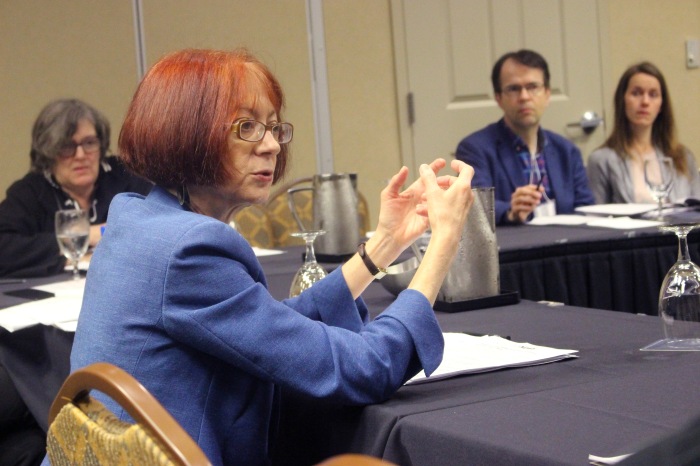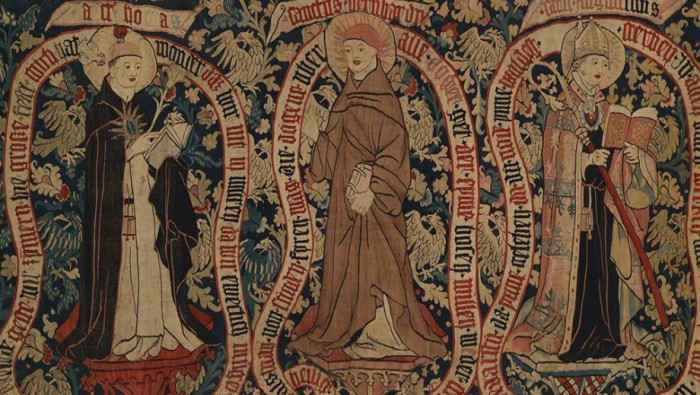
General Justice and the Common Good



Moral theologian Jean Porter (University of Notre Dame) will give the talk “What should we fear? Courage and cowardice in public life” on Monday, June 5, 2017 at 7pm in the Swift Hall 3rd Floor Lecture Hall at the University of Chicago. An audience Q & A will be followed by a reception in the Swift Hall Common Room. This talk is free and open to the public. Registration is required.
The talk and Q&A will be live-streamed at 7pm central time. For more information and to RSVP, go to https://virtue.uchicago.edu/porter
Amichai Amit is a PhD student in philosophy at the University of Chicago and a graduate assistant for Virtue, Happiness, & the Meaning of Life.


This article originally appeared in Tableau, the Division of the Humanities at the University of Chicago’s quarterly publication, as Being Well | Want a more fulfilling life? Put down your phone and look another human being in the eye by Courtney Guerra.
It’s easy to ignore the sign-offs at the end of email correspondence—they’re essentially content-neutral beyond conveying “message over.” But Candace Vogler, David B. and Clara E. Stern Professor in Philosophy, has a different style. She ends nearly all of her emails with “be well,” and, after talking with her, you get the sense that it’s intended as an actual imperative—albeit a kind and hopeful one.
It’s a small, subtle habit, but that’s the point. If you’re seeking to live more meaningfully, you might as well begin by imbuing meaning into the tiniest gestures of your everyday life.
As coleader of the Virtue, Happiness, and the Meaning of Life project, Vogler is an expert on living meaningfully. She and her collaborators study universal issues: “questions about the relations between being a good person and enjoying your life or having happiness, and having a sense of meaning or purpose,” she says. “We want to think about what it takes for those to line up.” And because the issues are universal, she’s eager to share the project’s work beyond the academy (through a blog, a podcast, a lecture series, and a culminating conference open to all).
The alignment of a satisfying and virtuous life, in her view, begins with self-transcendence: “You’ve got to see your life as enabling you to participate in a good that’s larger than you.” She’s not necessarily talking about volunteerism or devotion to a low-paying, labor-of-love type career. “I mean even in most business settings,” she says, “you’re usually working on a team of one sort or another—and in most sectors of the economy that I know anything about, if things aren’t going well on the team, work isn’t going well.” In essence: we’re all in this together, and we’ll all be better off if we keep that more readily in mind.
This point seems especially crucial as so many personal interactions are mediated through technology. “I’m really glad I’m too old to have grown up in a world where there were hundreds and hundreds and hundreds of images of me available this way and any time,” Vogler reflects. “Because it really does put us in a kind of Rousseau world, where we need everything out there to mirror back to us all the time.” She posits that in our post-smartphone reality, a “particular sense of anxiety, tenuousness, and weirdly overpublicized isolation” results from “not having learned many skills about how to connect with other human beings. And it is something you have to learn to do.”
While insecurity and awkwardness aren’t newly emergent phenomena, she thinks they’ve gotten worse. “The depth of the hunger to be connected to other people—that doesn’t change. The thought that you might be able to do that at 4 o’clock in the morning on the phone, that’s different. That’s a new thing.”
Vogler doesn’t dispute the utility of screen-based communications in certain contexts, but warns against letting them replace face-to-face interactions. Something as simple as saying hello to other people can “reassure your whole body that you’re in a world with fellow human beings”—fulfilling a fundamental animal need and offering a brief respite from whatever obligations you’re running to and from. If you’re chronically overscheduled, Vogler urges, that means “you’re too busy not to stop and say ‘good morning.’ If you’re that busy, it’s critically important that you do these things that don’t actually cost very much time at all.”
What’s her prescription for achieving a more meaningful life? “Greet people. You start with things like that. Notice that you’re in a human environment, that there are other people around, that you’re a member of a community that’s doing various things. Slowly, gently, in a friendly way, acknowledge them. That kind of little thing could be enough to make a huge difference.”

This article originally appeared in Tableau, the Division of the Humanities at the University of Chicago’s quarterly publication, as Scholarship of Self-Transcendence: Candace Vogler leads a search for the meaning of life by Courtney C. W. Guerra.
Candace Vogler, the David B. and Clara E. Stern Professor in Philosophy, is invested in her fellow human beings, and she’s determined to help them—us—find fulfillment. To tackle such a complex issue, she proposed the collaborative research project Virtue, Happiness, and the Meaning of Life, the aims of which are every bit as ambitious as its name implies. With major support from the John Templeton Foundation, this multiyear initiative—jointly led by Jennifer A. Frey, a philosopher at the University of South Carolina—explores self-transcendence: a feeling of connection to something beyond the individual self.
Of course, there’s no single way for human beings to attain self-transcendence: it can happen through spiritual practice, professional drive, familial bonds, or any number of commitments to a higher cause. Vogler’s group includes psychologists, philosophers, and religious thinkers from a variety of traditions. Many are UChicago colleagues: assistant professor Marc G. Berman and professor Howard C. Nusbaum in Psychology, associate professor Tahera Qutbuddin in Near Eastern Languages and Civilizations, and, in Philosophy, assistant professor Matthias Haase and Josef Stern, the William H. Colvin Professor Emeritus. The 30-scholar cohort represents institutions throughout the United States, Middle East, and Europe; they have been meeting and teaching since October 2015.
When she devised the project, Vogler says, “The ambition was to get a kind of deep integration between people working in very different disciplines” without relegating their work to the margins of less widely read, explicitly interdisciplinary publications. And it worked: the participants are “doing disciplinary work, they’re publishing in the disciplinary journals, and the inspiration for it is coming out of the frame of the project.”
These discussions have informed 10 published or forthcoming articles—a figure that “pretty dramatically exceeded” her initial expectations—with many more on the way. One essay that encapsulates the spirit of the project is being developed by Notre Dame theologian Jean Porter, about studies by Cornell University psychologist Katherine Kinzler on early childhood food preferences. Porter finds parallels between contemporary psychology and the views of Catholic philosopher Thomas Aquinas on the influence of group identity on what children choose to eat. (A draft is available on the Virtue Blog, along with other writings and filmed lectures.) This video helps to introduce and contextualize the group’s scholarship.
Like Porter’s essay, much of the project is “built on things that ought to be super interesting to people who are not academics,” says Vogler. She hopes a broad audience will attend the culminating conference at UChicago over the weekend of October 14–15. From there, Vogler plans to share her team’s findings with educators—from early childhood through MBA programs and beyond—to help promote self-transcendence at every stage of development. “There’s a big difference,” she points out, “between leading a life that’s super busy and leading a life that’s full.” Her hope is that the group’s work, as it reverberates out into the broader world, will help people achieve the latter.

Moral theologian Jean Porter (University of Notre Dame) will give the talk “What should we fear? Courage and cowardice in public life” on Monday, June 5, 2017 at 7pm in the Swift Hall 3rd Floor Lecture Hall at the University of Chicago. An audience Q & A will be followed by a reception in the Swift Hall Common Room. This talk is free and open to the public. Registration is required.
The talk and Q&A will be live-streamed at 7pm central time. For more information and to RSVP, go to https://virtue.uchicago.edu/porter
Here is the abstract for her talk:
Courage is pre-eminently an individual virtue. Yet we can also describe a community or a nation as courageous in its response to a threat or an attack. To take one well-known example, the behavior and attitudes of the English during the Blitz of 1940-41 offers an outstanding example of collective public courage. Somewhat to the surprise of government officials, the civilians subjected to intensive German bombing were not only relatively free of trauma, they were able to carry on with their lives, and even to be cheerful in the face of repeated attacks. The collective courage of the English under the Blitz was of course dependent on the courage of countless individuals, and yet it cannot be reduced to the sum of so many courageous acts and lives. The government promoted, and individuals cooperated in creating a set of practices and expectations that encouraged bravery and perseverance. At this point, England was a brave society, which both drew its courage from individuals and communicated it back to them.In my remarks this evening, I want to examine another example of public courage and public cowardice, which began to develop within the memory of many of us and is still unfolding today. I am referring to public reactions to the threat of terrorism since the attacks of 9/11. During and immediately after the attacks themselves, the men and women at the scene, together with the police, fire fighters, and medical personnel, behaved with exemplary bravery in the face of an unimaginable danger. These clear, unambiguous examples of courage do not call for extended analysis. However, at another level, public reactions to the threat of terrorist attacks present a more complex and ambiguous example. I want to suggest that we as a nation responded initially to terrorist assaults and the threat of further attacks with another kind of courage, not physical bravery but a firm resolve to hold onto central values, including equality, tolerance, and respect for the rule of law. However, over the past fifteen years, our attitudes as a civic society, as expressed by the actions taken in our name, reflect a growing unwillingness to live with risk and, correspondingly, a willingness to do almost anything to our supposed enemies, in order to secure our own safety. In other words, we as a nation have moved from courage to a kind of cowardice when it comes to our attitudes towards these threats. I will consider some of the possible causes of this development, and suggest some ways in which we might reclaim our initial courage.

We’re presenting a short series of abstracts of the work-in-progress our scholars will present and discuss at their June 2017 Working Group Meeting. Heather C. Lench is Associate Professor and Associate Head in the Department of Psychology at Texas A&M University and scholar with Virtue, Happiness, & the Meaning of Life.
People try to make decisions that will improve their lives and make them happy, and to do so, they rely on affective forecasts–predictions about how future outcomes will make them feel. The greater the emotional impact people expect a future outcome to have, the more effort and resources they invest in attaining or avoiding it. Understandably then, inaccuracy in affective forecasting has been identified as a major obstacle to making good decisions. Decades of research suggest that people are poor at predicting how they will feel and commonly overestimate the impact that future events will have on their emotions. Although the simplicity of this idea is intuitively attractive, recent studies have revealed that people are actually very good at forecasting some features of their emotional reaction. This investigation tested a new theoretical model that explains past inconsistent results demonstrating that sometimes people overestimate, sometimes underestimate, and are sometimes accurate in their forecasts. The investigation clearly differentiates forecasts of emotional intensity, frequency, and duration for the first time in the real-world setting of a controversial presidential election. Participants accurately forecast the intensity of their reaction, but overestimated how frequently they would feel emotions about the election and how much their mood would be impacted by the election. Consistent with our theoretical model, bias in forecasts of emotion were predicted by cognitive features. Overestimating the importance of the election resulted in overestimating the intensity of responses; overestimating the frequency of thinking about the election resulted in overestimating the frequency of responses; and overestimating the relevance of the election to personal goals predicted overestimating the impact of the election on mood. By allowing researchers to achieve greater precision about the features of emotion being predicted, this study clarifies when and why people overestimate, underestimate, and accurately predict their emotional reactions. Addressing this question is essential, not only for a theoretical understanding of how people think about their futures, but also for understanding how to intervene to improve decisions.
The results inform interventions designed to improve decision-making in applied domains including health, public policy, education, and economics. People making important decisions–such as whether to undergo surgery, listen to public health warnings, or pursue a specific career– will be better informed if they can accurately predict how the outcomes of their decisions will make them feel. Thus, interventions that improve forecasting are critically important for helping people make informed choices with implications for the length and quality of their lives.
*This is a collaborative project with Linda J. Levine, and is funded by the National Science Foundation (#1451297)
*A similar abstract was submitted for the December 2016 meeting; however, discussion of these primary findings was delayed in favor of presenting several serendipitous results given the surprising outcome of the election.

We’re presenting a short series of abstracts of the work-in-progress our scholars will present and discuss at their June 2017 Working Group Meeting.
Tahera Qutbuddin is Associate Professor of Arabic Literature at the University of Chicago.
1. Chapter on “The Sermon of Pious Counsel,” from my monograph project currently underway titled Classical Arabic Oratory: Religion, Politics and Oral Aesthetics of Public Address in the Early Islamic World.
Abstract: Showcasing a unique outlook on the purpose of human life in the early Islamic world of the seventh and eighth centuries, the sermon of pious counsel was one of the four major types of Arabic oration. Rooted in the pre-Islamic desert-dweller’s deep consciousness of cosmic cycles and human mortality, it was channeled toward priming for the afterlife by the monotheistic vision of Muhammad and the Qurʾan. Pious counsel also permeated the other three categories: Friday sermons were an obvious repository of devotional material, but battle speeches and political orations were also frequently framed in a pietistic vein. The orator concentrated on reminding his audience of the inevitability of death, the necessity of leading a pious and principled life preparing for an imminent hereafter, and remaining at all times conscious of God. The chapter I am submitting for our Workshop examines these key themes and their religious and ethical subthemes with copious textual examples. In addition, it outlines the sermon’s historical development, formulae and patterns, and briefly describes concurrent non-oratorical genres of pious counsel. It ends with the text, translation and analysis of an illustrative sermon attributed to a commander of the Kharijite “Seceders,” Qatari ibn al-Fujaʾah (d. ca. 698).
2. Short paper titled “Imam Ali’s Preaching of Peace and Pluralism: Five Categories of Exhortations to Justice, Equity and Compassion from The Path of Eloquence (Nahj al-balaghah) and A Treasury of Virtues (Dustur maʿalim al-hikam )”—expanded write-up from presentation originally prepared for UNESCO World Philosophy Day, 2014, Paris, at a conference titled: The Contribution of Ali ibn Abi Talib’s Thought to a Culture of Peace & Intercultural Dialogue.
Abstract: Imam Ali ibn Abi Talib’s (d. 661) strong advocacy of peace and pluralism is well known and works on multiple levels of individual, society and state. In this paper, I present five broad categories of these early Islamic teachings through a selection of Ali’s sayings, sermons, letters and verse: (1) seeking justice and abstaining from vengeance; (2) pluralism; (3) focus on the hereafter, not worldly gain; (4) personal ethics: respect and sanctity of living creatures; and (5) the role of government.
Kami adalah bintang utama di dunia togel online, diakui secara internasional dan di seluruh Asia! Dengan kualitas yang luar biasa, komitmen kuat, dan profesionalisme yang tak tergoyahkan, Bandar Togel telah menjaga reputasi ini selama bertahun-tahun di dunia judi toto togel. Mari bergabung dan rasakan semangat serta kualitas terbaik bersama kami!
Situs togel online resmi yang menawarkan pasaran Hongkong menjadi salah satu pilihan Toto Togel aman dan terpercaya bagi pemain. Dengan metode deposit yang fleksibel seperti Dana, pemain dapat dengan mudah menyetorkan modal mereka tanpa kesulitan. Pasaran HK menawarkan hasil yang adil dan cepat, menjadikannya salah satu pasaran yang paling diminati oleh para pemain togel.
Kemudahan transaksi menjadi salah satu alasan pemain memilih situs togel tertentu. Dengan pilihan deposit menggunakan Dana dan Gopay, beberapa Togel Terbesar menawarkan proses yang cepat dan aman untuk pemain, sekaligus menyediakan pasaran lengkap dengan peluang besar.
Menang di Bo Togel bukan hanya tentang keberuntungan; ada strategi yang dapat meningkatkan peluang Anda secara signifikan. Dari memilih nomor yang tepat hingga memahami pasaran yang paling menguntungkan, artikel ini akan membahas strategi terbaik untuk meraih Bo Togel Hadiah Terbesar. Dengan sedikit perencanaan dan analisis, Anda dapat meningkatkan kesempatan untuk meraih kemenangan besar di Bo Togel.
Banyak pemain togel yang mengandalkan hasil Keluaran Macau untuk merumuskan angka taruhan mereka. Hasil ini biasanya diumumkan secara resmi dan mencakup berbagai pasaran. Dengan mengecek keluaran Macau, pemain dapat menentukan angka terbaik untuk taruhan berikutnya.
Tidak hanya sekadar angka, tetapi Keluaran Macau juga menjadi alat analisis bagi bettor yang serius dalam bermain togel. Banyak pemain yang mencatat angka-angka yang keluar setiap hari untuk mencari tren tertentu yang bisa digunakan sebagai referensi taruhan berikutnya. Semakin cepat mereka mendapatkan informasi mengenai hasil keluaran, semakin baik pula mereka bisa mempersiapkan strategi taruhan.
Patch terbaru bikin beberapa konten lama relevan lagi dan layak dimainkan ulang menurut toto. Tips bermain konsisten lebih efektif daripada maraton sesekali. Progres jadi stabil.
Skin eksklusif rank tinggi ini bikin tampilan makin beda dan syaratnya ada di toto togel. Update anti-cheat bikin permainan lebih adil. Pemain jujur jadi lebih nyaman.
Salah satu keuntungan bermain Toto Togel adalah adanya berbagai jenis taruhan yang bisa dipilih. Mulai dari taruhan 2D yang lebih mudah dimenangkan hingga taruhan 4D yang menawarkan hadiah terbesar. Dengan memilih jenis taruhan yang sesuai dengan strategi dan modal, pemain bisa meningkatkan peluang menang mereka.
Tidak ada momen yang lebih ditunggu selain saat keluaran macau diumumkan, sebab pengumuman itu menjadi penentu keberhasilan strategi sekaligus tantangan untuk putaran berikutnya.
Pengembang Link Slot Gacor seperti NetEnt dan Play'n GO terus berinovasi dengan menghadirkan permainan slot yang kaya grafis, efek suara yang memukau, serta animasi yang memikat.
Salah satu rahasia sukses dalam bermain slot adalah mengelola modal dengan baik. Tentukan batas taruhan dan sesuaikan dengan peluang di setiap putaran. Dengan strategi pengelolaan modal yang tepat, Anda dapat bermain lebih lama dan meningkatkan peluang menang tanpa perlu mengorbankan terlalu banyak dana. Selain itu, manfaatkan juga scatter hitam yang tersedia di dalam permainan slot mahjong ways 2 terbaru hari ini.
Saat ini, banyak situs judi online yang menyediakan Slot Depo 5k dengan peluang kemenangan yang besar. Dengan modal yang sangat kecil, pemain masih memiliki kesempatan untuk menang besar. Slot ini sangat cocok bagi mereka yang ingin bermain hemat namun tetap merasakan sensasi kemenangan besar.
RTP slot tertinggi menjadi daya tarik utama dalam dunia perjudian slot online, karena memberikan peluang menang yang lebih tinggi dibandingkan game dengan RTP rendah. Dengan memanfaatkan rtp live, pemain bisa mengetahui apakah sebuah slot gacor hari ini atau tidak. Slot rtp tertinggi hari ini sering kali menawarkan kesempatan menang yang lebih besar, sehingga sangat penting untuk selalu memperbarui informasi tentang rtp slot tertinggi hari ini. Ini membantu para pemain untuk mengambil keputusan yang tepat dalam memilih permainan.
Banyak pemain mencari situs slot yang menawarkan pengalaman bermain terbaik, dan Slot Toto berhasil memenuhi ekspektasi tersebut dengan fitur unggulan yang tidak dimiliki oleh platform lain. Salah satu kelebihan utama yang membuat situs ini begitu diminati adalah variasi game yang sangat luas, mulai dari slot klasik hingga slot modern dengan tema menarik.
Keunggulan lain dari Slot777 adalah keberagaman tema dan jenis permainan slot yang ditawarkan. Dengan berbagai tema menarik seperti petualangan, fantasi, dan mitologi, pemain bisa memilih permainan yang paling sesuai dengan selera mereka. Setiap permainan di Slot 777 menawarkan pengalaman bermain yang berbeda, membuat pemain tidak cepat merasa bosan.
Para pemain kini tak perlu khawatir soal modal, karena dengan hadirnya Slot Depo 10k, mereka dapat langsung bermain berbagai jenis slot populer dan ikut bersaing mendapatkan kemenangan besar tanpa harus mengeluarkan banyak uang.
Strategi cerdas sering kali dimulai dengan modal terbatas, dan ketika seseorang mencoba berbagai jenis permainan, slot bet kecil menjadi pilihan aman untuk memahami pola mesin tanpa kehilangan terlalu banyak uang.
Untuk suasana bermain yang berbeda, slot Thailand menghadirkan tema lokal yang unik, ditambah animasi dan soundtrack khas yang membuat setiap permainan lebih hidup dan menyenangkan bagi penggemar slot.
Turnamen PvP antar guild ini bakal jadi ajang adu gengsi, info pendaftaran lengkap tersedia pada togel. Komunitas game online bikin suasana main jadi lebih hidup. Banyak tempat buat ngobrol dan berbagi pengalaman.
Update ini bikin build tertentu jadi meta baru seperti yang ramai di toto slot. Update sistem anti-cheat bikin permainan lebih adil. Pemain jujur jadi lebih nyaman.
Patch note terbaru ada perubahan cooldown yang penting, detailnya ada pada Togel Online. Komunitas game sering ngadain giveaway kecil. Lumayan kalau kamu hoki.
Event spesial kasih kesempatan dapet item yang biasanya mahal, cara farm-nya bisa kamu cek di toto slot. Jangan lupa belajar counter hero atau karakter tertentu. Ini penting banget buat ranked.
Turnamen PvP bakal pakai format baru yang lebih seru, formatnya bisa kamu cek di togel. Komunitas yang aktif biasanya punya jadwal mabar rutin. Ikut aja biar makin sering latihan.
Aktivitas yang menguji keberuntungan dan strategi memang selalu menarik, dan ketika orang mencari permainan seru, mereka akhirnya mempertimbangkan Toto, karena memberikan pengalaman bermain yang menantang sekaligus menghibur.